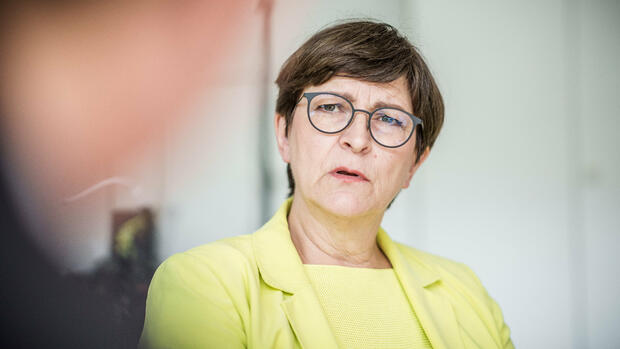Berlin The expected exit of the short message service Twitter from an EU agreement to combat disinformation on the Internet is causing outrage within the federal government. “With the Code of Conduct against disinformation, the EU has an effective tool for detecting and removing fake news. Twitter should be aware of its special responsibility in dealing with disinformation and strengthen its commitment rather than withdraw,” said Digital Minister Volker Wissing (FDP) of the Funke media group. “Otherwise we will have to talk about mandatory measures in connection with the Digital Services Act.”
Federal Interior Minister Nancy Faeser (SPD) is also relying on the new EU law on digital services (Digital Services Act, DSA). “Our right applies to all platforms, we will enforce it,” wrote the minister on Twitter. Faeser described the likely exit of the US platform from the EU code of conduct as “irresponsible”. Disinformation, lies and propaganda fueled hatred and its poison to democracy.
EU Internal Market Commissioner Thierry Breton announced on Twitter on Saturday night that the social network was leaving the voluntary EU code against disinformation, which Google, Tiktok, Microsoft and the Facebook parent company Meta had also joined.
But the commitments remained, Breton added. Beyond the voluntary agreements, the fight against disinformation will be a legal obligation from August 25 under the so-called EU law on digital services. The EU Commissioner announced that they would be prepared for enforcement.
Twitter is repeatedly accused of not doing enough to stop the spread of misinformation on the platform. Company boss Elon Musk, on the other hand, emphasizes that he wants to remove what he considers to be excessive restrictions on freedom of expression.
SPD leader Esken for intensified fight against disinformation
The chairwoman of the SPD, Saskia Esken, also voiced sharp criticism of the platform. “Twitter obviously does not want to counteract the increasing disinformation in its network and allows sexist, racist hatred and bad hatred against individuals or against marginalized groups to take up more and more space,” Esken told the Handelsblatt.
Therefore, the DSA must now “show Twitter in particular whether the member states are effectively demanding the responsibility of the major platforms in the fight against disinformation, against hate and hate speech and to protect our democracy”. The rules of the DSA are “absolutely suitable” for this.
>> Read also: These online services will be monitored by the EU in the future
In February, the EU Commission published reports on how online platforms implement the rules of the EU Code of Conduct. The Brussels authorities stated at the time that Twitter’s report had lagged behind the others. In their reports, the platforms showed, among other things, how many fake accounts were created and used or how fact checks affected the spread of disinformation.
The DSA is also intended to ensure, among other things, that platforms remove illegal content on their sites faster than before. In turn, it will be easier for users to report such content. Basically, large services have to follow more rules than small ones.
Elon Musk wants to remove restrictions on freedom of expression on Twitter
Breton said at the end of November that Twitter must step up its efforts to comply with EU law. The social network must introduce transparent user guidelines, moderate content significantly more, protect freedom of expression and take decisive action against disinformation.
Twitter boss Elon Musk had always emphasized that what he saw as excessive restrictions on freedom of expression on the platform should be eliminated. A good two weeks ago, the tech billionaire announced that after a chaotic six months, he would be handing over the top post at Twitter to advertising expert Linda Yaccarino.
SPD leader Esken shut down her Twitter account last year, citing, among other things, that the platform does nothing against fake profiles and is “extremely careless” in dealing with reported criminal content.
“The fact that Twitter has now left the EU agreement against the spread of disinformation on the Internet confirms my assessment and strengthens my decision to no longer appear on the platform,” said the SPD leader. At the same time, she advertised Mastodon, a Twitter competitor developed in Germany, which she uses herself.
Media houses and journalists, like parties and politicians, should also offer their information and opinion pieces there in future. “At the same time, I advocate that we as a state, in the sense of digital services of general interest, create the framework conditions for the emergence of alternatives to commercial digital public spaces that are oriented towards respect and the common good, the rule of law and democracy,” said Esken.
More: Truth instead of anger: how the EU is now taming the internet
